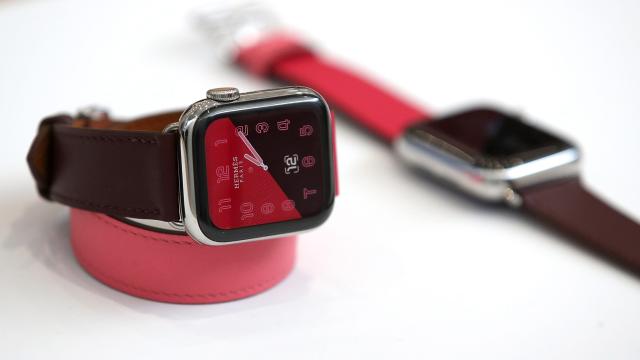The new $599-and-up Apple Watch will be able to measure the electrical activity of your heart, its groundbreaking ECG or EKG feature. (Both acronyms stand for “electrocardiogram.”) But there are some important caveats.
[referenced url=”https://www.lifehacker.com.au/2018/09/the-4-announcements-from-apples-iphone-event-that-actually-matter/” thumb=”https://i.kinja-img.com/gawker-media/image/upload/t_ku-large/qywawmivry7ktdelbauc.png” title=”The 4 Announcements From Apple’s iPhone Event That Actually Matter” excerpt=”Apple held its annual September event earlier today, announcing a new iPhone (a few of them, actually), a new Apple Watch, and a handful of other goodies.”]
What a Wearable ECG Is For
The ECG feature is supposed to detect when your heart goes into atrial fibrillation, which means it sort of vibrates instead of pumping in its usual rhythm. If you are in atrial fibrillation, or Afib, a lot of the time, your blood can form clots. And those clots can, eventually, make their way to your brain and cause a stroke.
For that reason, if you have Afib and your doctor thinks you’re at risk of a stroke, they may put you on blood thinners, drugs that make your blood less likely to clot. There may be other treatments. too.
You Don’t Need an Apple Watch to Monitor Your Heart
The Apple Watch’s ECG feature is new-ish, but it’s not the first product of its kind. You can buy a standalone ECG device for under $US100 ($140), for example. And since last year, AliveCor has sold an ECG-reading wristband for the Apple Watch ($US199 ($278) plus a subscription fee). What’s new is that the feature is now available as a built-in part of the Apple Watch, no special wristband required.
You can also get an ECG test done in at a clinic, where you’ll wear 12 electrodes, not one like in the watch. This is a more thorough test, and it will be interpreted by a doctor. Home ECG readings don’t replace it, although they can gather data on whether you’re in Afib all the time versus just the short time you’re at the doctor’s.
Experts Are Divided on Whether This is a Good Idea
If you have atrial fibrillation and were headed for a stroke, then of course it’s a good thing to catch it early and get further testing and treatment. That’s the plus. But does that mean every Apple Watch wearer should be monitored for heart problems?
Any screening program — where you check healthy people to see if they have signs of a problem — has drawbacks as well as potential benefits. We’ve seen this with cancer screenings like mammograms, for example. If a test says that you may have a serious health condition, you then have to go through more follow-up testing, and worry about your health, even if it turns out to be nothing.
In some cases, a test may lead people to take drugs or undergo procedures that have their own risks.
Are we truly better off with or without screening? That’s a tricky question, and it depends on what you’re screening for. The US Preventive Services Task Force does not recommend ECG screening for healthy adults at low risk of heart disease. For adults at high risk, they say there’s not enough evidence to recommend for or against it. (They were evaluating ECG screening in general, not the Apple Watch specifically.)
How Accurate Is It?
STAT reports that the Apple Watch’s ECG app got its FDA clearance on the basis of two studies. One found that the watch couldn’t read heart rhythms on 10 per cent of subjects, but among the remaining 90 per cent, it did pretty well. It told 98 per cent of the people with atrial fibrillation that they had it; and it also identified 99.6 per cent of the people who didn’t.
In a second study, the app detected 79 per cent of the people who had atrial fibrillation as measured by a traditional monitor.
But the more important question is this: if the app tells you you have atrial fibrillation, what’s the chance that it’s correct? Even if it’s only wrong a small per cent of the time, multiply that by all the people wearing Apple watches, and you get a huge number of false positives.
When you do the maths, chances are the app’s alert will be wrong 45 per cent of the time, physician-scientist Sekar Kathiresan told STAT.
And what good does that alert do you if you’re not able to access or afford a follow-up with a specialist? Even if you rush to the doctor, getting a surprise alert isn’t harmless. “I am afraid that this technology will lead to mostly hype, angst, overdiagnosis, medicalisation of normal life, and harms from overtreatment,” cardiac electrophysiologist John Mandrola wrote in Medscape.
Is It Worth the Uncertainty?
“We need a prospective study to find out, is the benefit really there?” cardiologist and researcher Eric Topol told me. I had asked whether, bottom line, the Apple Watch’s ECG feature is a good idea or a bad idea, and Topol says that depends in part on how many healthy people have suspicious-looking heart rhythms when they don’t truly have a problem.
We don’t know that yet. The device may pick up a lot of false positives, but for the real heart conditions it detects, it may indeed save lives.

Comments
2 responses to “What To Know About The ECG Feature In The New Apple Watch”
Anybody who has an idea of how to read ECGs (or just get a decent reading) knew this wouldn’t work very well. You can guess at AF by feeling for an irregular pulse – actual diagnostics needs a clean rhythm with an absent P wave. The Apple Watch isn’t likely to provide this even under ideal conditions.
At best it can probably hint at paroxysmal AF. We’d need to see some well designed studies (ie not just two) to see how sensitive and specific it is.
Worth noting too its USA only for launch